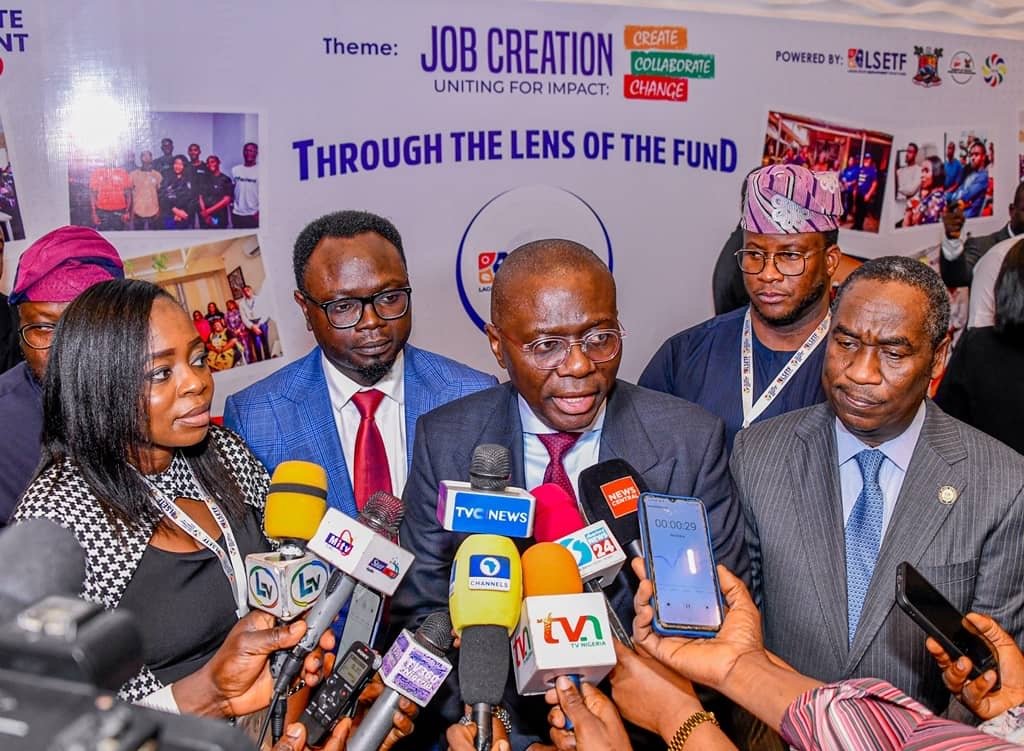



Partners and Stakeholders Discuss Job Creation at LSETF Jobs Summit
• “Our small business lending programs have directly and indirectly created 221,172 jobs.”
In Lagos State, the need to create sustainable economic opportunities for the burgeoning youth population has reshaped state government intervention in the job-generating sector.
Governor Babajide Sanwo-Olu disclosed that the new initiative would double the state’s investment in skills development and entrepreneurship, create more employment opportunities and increase productivity.
Sanwo-Olu believed that the trend of unrestrained migration of youths to cities called for adequate resource allocation to leverage entrepreneurship and skill acquisition programmes to create employment opportunities for the growing segment of the population.
The Governor was speaking before a gathering of partners and stakeholders in the job creation sector at the third Jobs Summit organised by the Lagos State Employment Trust Fund (LSETF).The event, themed: “Job Creation – Uniting for Impact: Create, Collaborate, Change”, was held at Eko Hotels and Suites, Victoria Island.
Sanwo-Olu said government has repurposed interventions to equip youths with practical skills and support the expansion of small and medium enterprises in order to create employment opportunities for the unemployed.
He said: “As a government, we have set in motion a model to create a resilient environment for the sustained deployment of interventions that foster job creation and entrepreneurial activity. Between 2035 and 2050, the number of young people in employment will skyrocket and we need to start planning for them today. The statistics are real and we need to ensure that we are creating opportunities for them to make their lives meaningful at that point.”
“Together with LSETF, we owe it to ourselves to equip talented youth with modern skills to meet the demands of today and prepare them for jobs that will serve them well in the future. The state government is ready to double its financial support to entrepreneurs and small businesses to achieve twice as much as we do today. We expect our partners in this project to also consider doubling their support to achieve our goal.”
Sanwo-Olu noted that while the LSETF has stabilised its operations and expanded its performance over the past eight years, the agency needs to focus on collecting and analysing employment data to have reliable employment data that can help government and partners allocate investments.
The governor said the data will help better understand trends in jobs and skills needed to meet today’s needs and prepare for the future.
He said: “Lagos has made great strides in improving the employment environment. Thanks to various initiatives and policies aimed at creating jobs and empowering the youth, unemployment has improved significantly. It is imperative that we continue to work together in the coming years.”
“I call on all stakeholders including government agencies, the private sector, civil society and international partners to join us in this mission. Together, we can create more opportunities, forge closer collaborations and drive the transformation Lagos needs.”
Acting Executive Secretary, LSETF, Feyisayo Alayande, noted that Lagos continues to respond proactively to the dynamic challenges of unemployment and unemployability, with the agency’s financial support to MSMEs having directly and indirectly created 221,172 jobs.
Alayande added that LSETF’s interventions have secured 204,000 direct jobs and impacted over 500,000 businesses through loan support to small and medium enterprises.
“Through our partnerships with the United States Defence Forces, the United Nations Development Programme and the Government of India (GIZ), we have trained 18,998 youths in Lagos in various sectors including creative, hospitality, construction, renewable energy, hospitality and business support. Sixty-five per cent of the beneficiaries have secured employment and joined the new taxpaying class in the state,” she said.
Commissioner for Wealth Creation and Employment, Akinyemi Azigbotafe, said the team at the event spoke about the collective responsibility needed to bring about change in the job market.
Ajigbotafe said the burden of creating jobs and employment opportunities for the unemployed cannot be borne by government alone, stressing that this action requires partnership with the private sector.
LSETF Chairman, Bola Akinsola, said the demand for gainful employment was more urgent than ever, stressing that the collaborative approach adopted by the organisation was vital to sustaining job creation.
“As Lagos’ economy evolves, so too does the aspirations of the youth for decent employment. The demand for gainful employment is more urgent than ever. We need to create more jobs faster than the demand. It is our duty as stakeholders to forge a unified path towards a prosperous future,” Adesola said.
In his keynote address, the Chairman of FATE Foundation, Mr. Fola Adeola, noted that the large youth population in the country should be a boon for Lagos’ growth, stressing that the unemployed youth population may continue to be a burden on the country unless strategic action is taken to create employment opportunities for the youths.
A highlight of the event was the launch of the Labour Market Information System by Sanwo-Olu, a platform that will provide up-to-date information to individuals and institutions seeking data on employment in the state.

